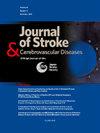Association between dehydration and stroke, a retrospective cohort study of a large database
IF 1.8
4区 医学
Q3 NEUROSCIENCES
Journal of Stroke & Cerebrovascular Diseases
Pub Date : 2025-08-22
DOI:10.1016/j.jstrokecerebrovasdis.2025.108430
引用次数: 0
Abstract
Background
Aging changes contribute to higher rates of dehydration in older adults. We searched a large database to see if there is an association between stroke and dehydration.
Methods
A retrospective cohort design utilizing TriNetX, an electronic health record database from 55 United States healthcare organizations with >85 million patients. The study population consisted of adults aged 80 years and older who had healthcare encounters between January 1, 2018 and December 31, 2019, before the pandemic. The dehydration cohort was identified using ICD-10 diagnosis codes and laboratory test results. Outcome measures included one of three stroke types: intracerebral hemorrhage, ischemic stroke, and transient ischemic attack, based on ICD-10 codes. A sub analysis of individuals with diabetes was undertaken.
Results
Of 3,125,610 adults, 80 and older, 563,476 were dehydrated. Individuals with diabetes numbered 443,450 and 101,661 were dehydrated. The dehydration cohorts in both populations had a greater percentage of females, non-Hispanic, white individuals, and were slightly older (82.7 vs. 82.4, p <0.001). After controlling for common confounders in propensity score matching, individuals with dehydration were 1.98-3.99 times more likely to develop stroke: intracerebral hemorrhage (OR=3.99, 95% CI=3.41-4.67), ischemic stroke (OR=1.98, 95% CI=1.9-2.07), and TIA (OR=2.88, 95% CI=2.74-3.28). The diabetes group showed: intracerebral hemorrhage (OR=6.76, 95% CI=4-11.42), ischemic stroke (OR=1.97, 95% CI=1.81-2.16), and TIA (OR=2.81, 95% CI=2.33-3.39).
Conclusion
A strong association between dehydration and stroke was found. The largest association was with intracerebral hemorrhage. Both physiologic changes of normal aging and medications used to treat cardiovascular stroke risk factors increase older adults’ risk for dehydration. The strength of this study is the propensity risk management of over 3 million older adults (≥80 years). Limitations of this study include the retrospective nature of database evaluation. Future studies should evaluate whether increased hydration status leads to decreased stroke.
脱水和中风之间的关系,一个大型数据库的回顾性队列研究。
背景:年龄变化导致老年人脱水率升高。我们搜索了一个大型数据库,看看中风和脱水之间是否存在联系。方法:采用回顾性队列设计,利用TriNetX,一个来自55个美国医疗保健机构的电子健康记录数据库,其中包括bb85万患者。研究人群由80岁及以上的成年人组成,他们在大流行之前的2018年1月1日至2019年12月31日期间接受过医疗保健。根据ICD-10诊断代码和实验室检测结果确定脱水队列。结果测量包括三种中风类型之一:脑出血、缺血性中风和短暂性缺血性发作,基于ICD-10代码。对糖尿病患者进行亚组分析。结果:在3125610名80岁及以上的成年人中,563476人脱水。443,450和101,661名糖尿病患者脱水。脱水组中女性、非西班牙裔、白人的比例更高,年龄略大(82.7比82.4,p)。最大的关联是脑出血。正常衰老的生理变化和用于治疗心血管中风危险因素的药物都增加了老年人脱水的风险。这项研究的优势在于对300多万老年人(≥80岁)的倾向风险管理。本研究的局限性包括数据库评估的回顾性性质。未来的研究应该评估水合状态的增加是否会导致中风的减少。
本文章由计算机程序翻译,如有差异,请以英文原文为准。
求助全文
约1分钟内获得全文
求助全文
来源期刊

Journal of Stroke & Cerebrovascular Diseases
Medicine-Surgery
CiteScore
5.00
自引率
4.00%
发文量
583
审稿时长
62 days
期刊介绍:
The Journal of Stroke & Cerebrovascular Diseases publishes original papers on basic and clinical science related to the fields of stroke and cerebrovascular diseases. The Journal also features review articles, controversies, methods and technical notes, selected case reports and other original articles of special nature. Its editorial mission is to focus on prevention and repair of cerebrovascular disease. Clinical papers emphasize medical and surgical aspects of stroke, clinical trials and design, epidemiology, stroke care delivery systems and outcomes, imaging sciences and rehabilitation of stroke. The Journal will be of special interest to specialists involved in caring for patients with cerebrovascular disease, including neurologists, neurosurgeons and cardiologists.
 求助内容:
求助内容: 应助结果提醒方式:
应助结果提醒方式:


